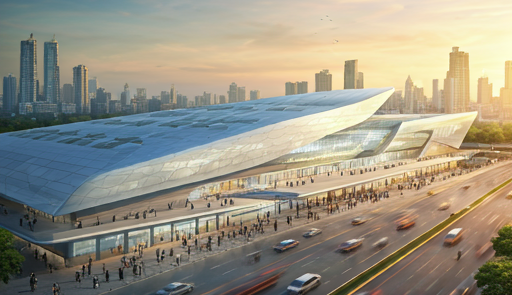The Brihanmumbai Municipal Corporation (BMC) has initiated a major infrastructure project with the floating of a ₹1,481 crore tender for the construction of a transportation and commercial hub at the former Dahisar octroi naka. Set to be developed on an 18,604 sq m plot along the Western Express Highway, this ambitious project aims to revolutionise intercity travel and reduce traffic congestion across Mumbai.
The Dahisar transport hub will cater to approximately 450 interstate buses and 1,400 cars, providing parking and operational facilities that will prevent these buses from entering and clogging the city’s already congested roads. The facility is expected to primarily serve buses from Gujarat, Rajasthan, and northern states, directing them to terminate at this integrated hub instead of navigating through the city centre. The hub is designed with a multi-faceted approach, combining transportation efficiency with commercial development. In addition to the bus terminus, the project will feature retail spaces, recreational areas, banquet halls, and star hotels, aiming to generate revenue for long-term sustainability. Additionally, the facility will house app-based cab services and taxi stands to ensure passengers have smooth access to further transportation.
As Mumbai’s traffic woes continue to grow, with buses occupying vital road space, the hub will play a crucial role in easing these problems by providing a dedicated space for intercity buses. The hub is strategically located near the Pandurangwadi Interchange Metro Station, offering seamless connectivity with Metro lines 9 and 10, and links directly to the Mumbai-Ahmedabad highway, ensuring smooth transit for long-distance passengers. According to a BMC official, the plan also includes exploring options for smaller shuttle services that will ferry passengers from the transport hub to their final destinations within Mumbai. This approach aims to make commuting more efficient and reduce pressure on the city’s internal roads. The Western Express Highway’s proximity makes the location ideal for such an infrastructure development.
The project has been well-received by local residents and activists. A Dahisar resident commented, “This is a much-needed initiative. The constant traffic caused by buses parked on city roads creates a lot of congestion. This hub will finally provide a solution.” The land allocation for the project comes after octroi—a tax collected on goods entering the city—was abolished following the introduction of GST in 2017. The Dahisar octroi naka lands, previously considered for other redevelopment projects, were retained by the BMC for the transport hub due to its significance for civic infrastructure. Once operational, the hub will not only reduce traffic but also help generate revenue through its commercial and retail spaces, making it a self-sustaining project. The Mankhurd octroi naka will undergo a similar transformation, creating an integrated bus terminus at the city’s eastern entry point. By enhancing Mumbai’s connectivity and easing its traffic issues, the BMC’s transport hub project is set to redefine how the city manages its expanding transportation needs.


